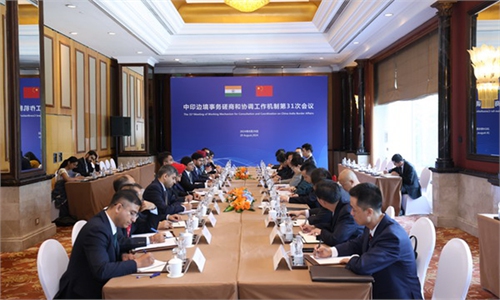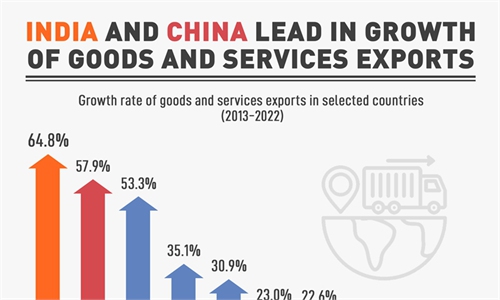
India Illustration: Liu Rui/GT
India's scrutiny of Chinese investments poses a dilemma for its own development, with political and economic considerations intertwined. It is imperative for India to strike a delicate balance between protecting national security and promoting economic development. Without enhancing mutual trust, India will struggle to boost Chinese investments that are vital for the advancement of its manufacturing sector.
Indian Foreign Minister Subrahmanyam Jaishankar said at the ET World Leaders Forum on Saturday that it's "common sense" to scrutinize Chinese investments, noting that many countries do the same for security reasons, Indian media reported.
His remarks, to a certain extent, reflect India's attitude toward China on geopolitical and security issues, an important reason why India remains distrustful of Chinese investments.
Such an attitude is influenced by some Western countries, particularly the US, which view China as a "security threat" and has pushed for "decoupling" from China.
The result of India following the West in overstretching the security concept in economic issues is that India's investment policy toward China has fallen deeply into a security dilemma. On the one hand, India needs Chinese investments to promote the development of its domestic manufacturing, but on the other hand, it is wary of Chinese investments due to fears over potential "security risks."
These dual concerns not only fail to effectively promote India's manufacturing development but also exacerbate its domestic divisions. Some Indian media reports said that Indian electronics manufacturers have suffered losses due to restrictions on Chinese businesses.
It is understandable that every country has its own legitimate and reasonable system for reviewing foreign investments. But since the Indian government in 2020 implemented restrictions on foreign direct investment (FDI) from countries sharing land borders with India, its scrutiny of Chinese investments has been particularly strict.
The fundamental reason why India conducts strict scrutiny of Chinese investment is actually a trust issue. The deep-rooted hostility toward China among some Indian elites, interest groups and Western lobbyists continues to take advantage of the lack of mutual trust between China and India to influence decision-making in New Delhi. However, restricting Chinese investment cannot promote the development of Indian manufacturing, but instead affects India's investment appeal.
In the fiscal year 2023-24, India's actual FDI decreased by 37 percent year-on-year to $26.6 billion, according to Indian media reports - the lowest level since 2006-07. The development of the manufacturing sector relies on industrial clusters composed of small and medium-sized enterprises, and India's restrictions on Chinese investments are not conducive to the formation of the Indian manufacturing ecosystem.
Indeed, anyone who knows something about bilateral trade and investment understands that at present cooperation with China is essential for India's manufacturing development.
Despite India's imposition of economic and trade restrictions on China, trade between India and China has actually increased. In the fiscal year 2023-24, China once again became India's largest trading partner. According to India's official data, bilateral trade reached $118.4 billion. Data from the India-based Global Trade Research Initiative showed that 98.5 percent of the goods that India imported from China are industrial products, accounting for about 30 percent of India's total industrial imports, Indian media reported.
The trade figures demonstrate the complementarity of the industrial chains between China and India, which provides huge potential for cooperation. India needs to recognize that if it wants to achieve rapid development of its manufacturing sector, easing restrictions on Chinese investments and improvements in its business environment are necessary measures.
China and India need to improve their mutual trust, especially India needs to trust Chinese investment, and enhanced economic and trade exchanges are conducive to this process. This is what really makes sense both economically and politically.



